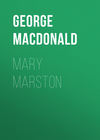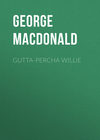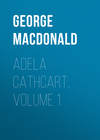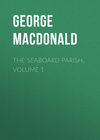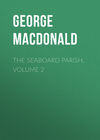Loe raamatut: «Mary Marston», lehekülg 21
CHAPTER XXXIV.
A STRAY SOUND
Mary went to see Letty as often as she could, and that was not seldom; but she had scarcely a chance of seeing Tom; either he was not up, or had gone—to the office, Letty supposed: she had no more idea of where the office was, or of the other localities haunted by Tom, than he himself had of what spirit he was of.
One day, when Mary could not help remarking upon her pale, weary looks, Letty burst into tears, and confided to her a secret of which she was not the less proud that it caused her anxiety and fear. As soon as she began to talk about it, the joy of its hope began to predominate, and before Mary left her she might have seemed to a stranger the most blessed little creature in the world. The greatness of her delight made Mary sad for her. To any thoughtful heart it must be sad to think what a little time the joy of so many mothers lasts—not because their babies die, but because they live; but Mary's mournfulness was caused by the fear that the splendid dawn of mother-hope would soon be swallowed in dismal clouds of father-fault. For mothers and for wives there is no redemption, no unchaining of love, save by the coming of the kingdom—in themselves . Oh! why do not mothers, sore-hearted mothers at least, if none else on the face of the earth, rush to the feet of the Son of Mary?
Yet every birth is but another link in the golden chain by which the world shall be lifted to the feet of God. It is only by the birth of new children, ever fresh material for the creative Spirit of the Son of Man to work upon, that the world can finally be redeemed. Letty had no ideas about children, only the usual instincts of appropriation and indulgence; Mary had a few, for she recalled with delight some of her father's ways with herself. Him she knew as, next to God, the source of her life, so well had he fulfilled that first duty of all parents—the transmission of life. About such things she tried to talk to Letty, but soon perceived that not a particle of her thought found its way into Letty's mind: she cared nothing for any duty concerned—only for the joy of being a mother.
She grew paler yet and thinner; dark hollows came about her eyes; she was parting with life to give it to her child; she lost the girlish gayety Tom used to admire, and the something more lovely that was taking its place he was not capable of seeing. He gave her less and less of his company. His countenance did not shine on her; in her heart she grew aware that she feared him, and, ever as she shrunk, he withdrew. Had it not now been for Mary, she would likely have died. She did all for her that friend could. As often as she seemed able, she would take her for a drive, or on the river, that the wind, like a sensible presence of God, might blow upon her, and give her fresh life to take home with her. So little progress did she make with Hesper, that she could not help thinking it must have been for Letty's sake she was allowed to go to London.
Mr. and Mrs. Redmain went again to Durnmelling, but Mary begged Hesper to leave her behind. She told her the reason, without mentioning the name of the friend she desired to tend. Hesper shrugged her shoulders, as much as to say she wondered at her taste; but she did not believe that was in reality the cause of her wish, and, setting herself to find another, concluded she did not choose to show herself at Testbridge in her new position, and, afraid of losing if she opposed her, let her have her way. Nor, indeed, was she so necessary to her at Durnmelling, where there were few visitors, and comparatively little dressing was required: for the mere routine of such ordinary days, Jemima was enough, who, now and then called by Mary to her aid, had proved herself handy and capable, and had learned much. So, all through the hottest of the late summer and autumn weather, Mary remained in London, where every pavement seemed like the floor of a baker's oven, and, for all the life with which the city swarmed, the little winds that wandered through it seemed to have lost their vitality. How she longed for the common and the fields and the woods, where the very essence of life seemed to dwell in the atmosphere even when stillest, and the joy that came pouring from the throats of the birds seemed to flow first from her own soul into them! The very streets and lanes of Testbridge looked like paradise to Mary in Lon-don. But she never wished herself in the shop again, although almost every night she dreamed of the glad old time when her father was in it with her, and when, although they might not speak from morning to night, their souls kept talking across crowd and counters, and each was always aware of the other's supporting presence.
Longing, however, is not necessarily pain—it may, indeed, be intensest bliss; and, if Mary longed for the freedom of the country, it was not to be miserable that she could not have it. Her mere thought of it was to her a greater delight than the presence of all its joys is to many who desire them the most. That such things, and the possibility of such sensations from them, should be in the world, was enough to make Mary jubilant. But, then, she was at peace with her conscience, and had her heart full of loving duty. Besides, an active patience is a heavenly power. Mary could not only walk along a pavement dry and lifeless as the Sahara, enjoying the summer that brooded all about and beyond the city, but she bore the re-freshment of blowing winds and running waters into Letty's hot room, with the clanging street in front, and the little yard behind, where, from a cord stretched across between the walls, hung a few pieces of ill-washed linen, motionless in the glare, two plump sparrows picking up crumbs in their shadow—into this live death Mary would carry a tone of breeze, and sailing cloud, and swaying tree-top. In her the life was so concentrated and active that she was capable of communicating life—the highest of human endowments.
One evening, as Letty was telling her how the dressmaker up stairs had been for some time unwell, and Mary was feeling reproachful that she had not told her before, that she might have seen what she could do for her, they became aware, it seemed gradually, of one softest, sweetest, faintest music-tone coming from somewhere—but not seeming sufficiently of this world to disclose whence. Mary went to the window: there was nothing capable of music within sight. It came again; and intermittingly came and came. For some time they would hear nothing at all, and then again the most delicate of tones would creep into their ears, bringing with it more, it seemed to Mary in the surprise of its sweetness, than she could have believed single tone capable of carrying. Once or twice a few consecutive sounds made a division strangely sweet; and then again, for a time, nothing would reach them but a note here and a note there of what she was fain to imagine a wonderful melody. The visitation lasted for about an hour, then ceased. Letty went to bed, and all night long dreamed she heard the angels calling her. She woke weeping that her time was come so early, while as yet she had tasted so little of the pleasure of life. But the truth was, she had as yet, poor child, got so little of the good of life, that it was not at all time for her to go.
When her hour drew near, Tom condescended—unwillingly, I am sorry to say, for he did not take the trouble to understand her feelings—to leave word where he might be found if he should be wanted. Even this assuagement of her fears Letty had to plead for; Mary's being so much with her was to him reason, and he made it excuse, for absence; he had begun to dread Mary. Nor, when at length he was sent for, was he in any great haste; all was well over ere he arrived. But he was a little touched when, drawing his face down to hers, she feebly whispered, "He's as like to you, Tom, as ever small thing was to great!" She saw the slight emotion, and fell asleep comforted.
It was night when she woke. Mary was sitting by her.
"O Mary!" she cried, "the angels have been calling me again. Did you hear them?"
"No," answered Mary, a little coldly, for, if ever she was inclined to be hard, it was toward self-sentiment. "Why do you think the angels should call you? Do you suppose them very desirous of your company?"
"They do call people," returned Letty, almost crying; "and I don't know why they mightn't call me. I'm not such a very wicked person!"
Mary's heart smote her; she was refusing Letty the time God was giving her! She could not wake her up, and, while God was waking her, she was impatient!
"I heard the call, too, Letty," she said; "but it was not the angels. It was the same instrument we heard the other night. Who can there be in the house to play like that? It was clearer this time. I thought I could listen to it a whole year."
"Why didn't you wake me?" said Letty.
"Because the more you sleep the better. And the doctor says I mustn't let you talk. I will get you something, and then you must go to sleep again."
Tom did not appear any more that night; and, if they had wanted him now, they would not have known where to find him. He was about nothing very bad—only supping with some friends—such friends as he did not even care to tell that he had a son.
He was ashamed of being in London at this time of the year, and, but that he had not money enough to go anywhere except to his mother's, he would have gone, and left Letty to shift for herself.
With his child he was pleased, and would not seldom take him for a few moments; but, when he cried, he was cross with him, and showed himself the unreasonable baby of the two.
The angels did not want Letty just yet, and she slowly recovered.
For Mary it was a peaceful time. She was able to read a good deal, and, although there were no books in Mr. Redmain's house, she generally succeeded in getting such as she wanted. She was able also to practice as much as she pleased, for now the grand piano was entirely at her service, and she took the opportunity of having a lesson every day.
CHAPTER XXXV.
THE MUSICIAN
One evening, soon after the baby's arrival, as Mary sat with him in her lap, the sweet tones they had heard twice before came creeping into her ears so gently that she seemed to be aware of their presence only after they had been for some time coming and going: she laid the baby down, and, stealing from the room, listened on the landing. Certainly the sounds were born in the house, but whether they came from below or above she could not tell. Going first down the stair, and then up, she soon satisfied herself that they came from above, and thereupon ventured a little farther up the stair.
She had already been to see the dressmaker, whom she had come to know through the making of Hesper's twilight robe of cloud, had found her far from well, and had done what she could for her. But she was in no want, and of more than ordinary independence—a Yorkshire woman, about forty years of age, delicate, but of great patience and courage; a plain, fair, freckled woman, with a belief in religion rather than in God. Very strict, therefore, in her observances, she thought a great deal more of the Sabbath than of man, a great deal more of the Bible than of the truth, and ten times more of her creed than of the will of God; and, had she heard any one utter such words as I have just written, would have said he was an atheist. She was a worthy creature, notwithstanding, only very unpleasant if one happened to step on the toes of a pet ignorance. Mary soon discovered that there was no profit in talking with her on the subjects she loved most: plainly she knew little about them, except at second hand—that is, through the forms of other minds than her own. Such people seem intended for the special furtherance of the saints in patience; being utterly unassailable by reason, they are especially trying to those who desire to stand on brotherly terms with all men, and so are the more sensitive to the rudeness that always goes with moral stupidity; intellectual stupidity may coexist with the loveliness of an angel. It is one of the blessed hopes of the world to come, that there will be none such in it. But why so many words? I say to myself, Will one of such as I mean recognize his portrait in my sketch? Many such have I met in my young days, and in my old days I find they swarm still. I could wish that all such had to earn their own bread like Ann Byron: had she been rich, she would have been unbearable. Women like her, when they are well to do, walk with a manly stride, make the tails of their dresses go like the screw of a steamer behind them, and are not unfrequently Scotch.
As Mary went up, the music ceased; but, hoping Miss Byrom would be able to enlighten her concerning its source, she continued her ascent, and knocked at her door. A voice, rather wooden, yet not without character, invited her to enter.
Ann sat near the window, for, although it was quite dusk, a little use might yet be made of the lingering ghost of the daylight. Almost all Mary could see of her was the reflection from the round eyes of a pair of horn spectacles.
"How do you do, Miss Byrom?" she said.
"Not at all well," answered Ann, almost in a tone of offense.
"Is there nothing I can do for you?" asked Mary.
"We are to owe no man anything but love, the apostle tells us."
"You must owe a good deal of that, then," said Mary, one part vexed, and two parts amused, "for you don't seem to pay much of it."
She was just beginning to be sorry for what she had said when she was startled by a sound, very like a little laugh, which seemed to come from behind her. She turned quickly, but, before she could see anything through the darkness, the softest of violin-tones thrilled the air close beside her, and then she saw, seated on the corner of Ann's bed, the figure of a man—young or old, she could not tell. How could he have kept so still! His bow was wandering slowly about over the strings of his violin; but presently, having overcome, as it seemed, with the help of his instrument, his inclination to laugh, he ceased, and all was still.
"I came," said Mary, turning again to Ann, "hoping you might be able to tell me where the sweet sounds came from which we have heard now two or three times; but I had no idea there was any one in the room besides yourself.—They come at intervals a great deal too long," she added, turning toward the figure in the darkness.
"I am afraid my ear is out sometimes," said the man, mistaking her remark. "I think it comes of the anvil."
The voice was manly, though gentle, and gave an impression of utter directness and simplicity. It was Mary's turn, however, not to understand, and she made no answer.
"I am very sorry," the musician went on, "if I annoyed you, miss."
Mary was hastening to assure him that the fact was quite the other way, when Ann prevented her.
"I told you so!" she said; "you make an idol of your foolish plaything, but other people take it only for the nuisance it is."
"Indeed, you never were more mistaken," said Mary. "Both Mrs. Helmer and myself are charmed with the little that reaches us. It is, indeed, seldom one hears tones of such purity."
The player responded with a sigh of pleasure.
"Now there you are, miss," cried Ann, "a-flattering of his folly till not a word I say will be of the smallest use!"
"If your words are not wise," said Mary, with suppressed indignation, "the less he heeds them the better."
"It ain't wise, to my judgment, miss, to make a man think himself something when he is nothing. It's quite enough a man should deceive his own self, without another to come and help him."
"To speak the truth is not to deceive," replied Mary. "I have some knowledge of music, and I say only what is true."
"What good can it be spending his time scraping horsehair athort catgut?"
"They must fancy some good in it up in heaven," said Mary, "or they wouldn't have so much of it there."
"There ain't no fiddles in heaven," said Ann, with indignation; "they've nothing there but harps and trumpets." Mary turned to the man, who had not said a word.
"Would you mind coming down with me," she said, "and playing a little, very softly, to my friend? She has a little baby, and is not strong. It would do her good."
"She'd better read her Bible," said Ann, who, finding she could no longer see, was lighting a candle.
"She does read her Bible," returned Mary; "and a little music would, perhaps, help her to read it to better purpose."
"There, Ann!" cried the player.
The woman replied with a scornful grunt.
"Two fools don't make a wise man, for all the franchise," she said.
But Mary had once more turned toward the musician, and in the light of the candle was met by a pair of black eyes, keen yet soft, looking out from tinder an overhanging ridge of forehead. The rest of the face was in shadow, but she could see by the whiteness, through a beard that clouded all the lower part of it, that he was smiling to himself: Mary had said what pleased him, and his eyes sought her face, and seemed to rest on it with a kind of trust, and a look as if he was ready to do whatever she might ask of him.
"You will come?" said Mary.
"Yes, miss, with all my heart," he replied, and flashed a full smile that rested upon Ann, and seemed to say he knew her not so hard as she looked.
Rising, he tucked his violin under his arm, and showed himself ready to follow.
"Good night, Miss Byrom," said Mary.
"Good night, miss," returned Ann, grimly. "I'm sorry for you both, miss. But, until the spirit is poured out from on high, it's nothing but a stumbling in the dark."
This last utterance was a reflection rather than a remark.
Mary made no reply. She did not care to have the last word; nor did she fancy her cause lost when she had not at hand the answer that befitted folly. She ran down the stair, and at the bottom stood waiting her new acquaintance, who descended more slowly, careful not to make a noise.
She could now see, by the gaslight that burned on the landing, a little more of what the man was. He was powerfully built, rather over middle height, and about the age of thirty. His complexion was dark, and the hand that held the bow looked grimy. He bore himself well, but a little stiffly, with a care over his violin like that of a man carrying a baby. He was decidedly handsome, in a rugged way—mouth and chin but hinted through a thick beard of darkest brown.
"Come this way," said Mary, leading him into Letty's parlor. "I will tell my friend you are come. Her room, you see, opens off this, and she will hear you delightfully. Pray, take a seat."
"Thank you, miss," said the man, but remained standing.
"I have caught the bird, Letty," said Mary, loud enough for him to hear; "and he is come to sing a little to you—if you feel strong enough for it."
"It will do me good," said Letty. "How kind of him!"
The man, having heard, was already tuning his violin when Mary came from the bedroom, and sat down on the sofa. The instant he had got it to his mind, he turned, and, going to the farthest corner of the room, closed his eyes tight, and began to play.
But how shall I describe that playing? how convey an idea of it, however remote? I fear it is nothing less than presumption in me, so great is my ignorance, to attempt the thing. But would it be right, for dread of bringing shame upon me through failure, to leave my readers without any notion of it at all? On the other hand, I shall, at least, have the merit of daring to fail—a merit of which I could well be ambitious.
If, then, my reader will imagine some music-loving sylph attempting to guide the wind among the strings of an Aeolian harp, every now and then for a moment succeeding, and then again for a while the wind having its own way, he will gain, I think, something like a dream-notion of the man's playing. Mary tried hard to get hold of some clew to the combinations and sequences, but the motive of them she could not find. Whatever their source, there was, either in the composition itself or in his mode of playing, not a little of the inartistic, that is, the lawless. Yet every now and then would come a passage of exquisite melody, owing much, however, no doubt, to the marvelous delicacy of the player's tones, and the utterly tender expression with which he produced them. But ever as she thought to get some insight into the movement of the man's mind, still would she be swept away on the storm of some change, seeming of mood incongruous.
At length came a little pause. He wiped his forehead with a blue cotton handkerchief, and seemed ready to begin again. Mary interrupted him with the question:
"Will you please tell me whose music you have been playing?"
He opened his eyes, which had remained closed even while he stood motionless, and, with a smile sweeter than any she had ever seen on such a strong face, answered:
"It's nobody's, miss."
"Do you mean you have been extemporizing all this time?"
"I don't know exactly what that means."
"You must have learned it from notes?"
"I couldn't read them if I had any to read," he answered.
"Then what an ear and what a memory you must have! How often have you heard it?"
"Just as often as I've played it, and no oftener. Not being able to read, and seldom hearing any music I care for, I'm forced to be content with what runs out at my fingers when I shut my eyes. It all comes of shutting my eyes. I couldn't play a thing but for shutting my eyes. It's a wonderful deal that comes of shutting your eyes! Did you never try it, miss?"
Mary was so astonished both by what he said and the simplicity with which he said it, having clearly no notion that he was uttering anything strange, that she was silent, and the man, after a moment's retuning, began again to play. Then did Mary gather all her listening powers, and brace her attention to the tightest—but at first with no better success. And, indeed, that was not the way to understand. It seems to me, at least, in my great ignorance, that one can not understand music unless he is humble toward it, and consents, if need be, not to understand. When one is quiescent, submissive, opens the ears of the mind, and demands of them nothing more than the hearing—when the rising waters of question retire to their bed, and individuality is still, then the dews and rains of music, finding the way clear for them, soak and sink through the sands of the mind, down, far down, below the thinking-place, down to the region of music, which is the hidden workshop of the soul, the place where lies ready the divine material for man to go making withal.
Weary at last with vain effort, she ceased to endeavor, and in a little while was herself being molded by the music unconsciously received to the further understanding of it. It wrought in her mind pictures, not thoughts. It is possible, however, my later knowledge may affect my description of what Mary then saw with her mind's eye.
First there was a crowd in slow, then rapid movement. Arose cries and entreaties. Came hurried motions, disruption, and running feet. A pause followed. Then woke a lively melody, changing to the prayer of some soul too grateful to find words. Next came a bar or two of what seemed calm, lovely speech, then a few slowly delivered chords, and all was still.
She came to herself, and then first knew that, like sleep, the music had seized her unawares, and she had been understanding, or at least enjoying, without knowing it. The man was approaching her from his dark corner. His face was shining, but plainly he did not intend more music, for his violin was already under his arm. He made her a little awkward bow—not much more than a nod, and turned to the door. He had it half open, and not yet could Mary speak. For Letty, she was fast asleep.
From the top of the stair came the voice of Ann, screaming:
"Here's your hat, Joe. I knew you'd be going when you played that. You'd have forgotten it, I know!"
Mary heard the hat come tumbling down the stair.
"Thank you, Ann," returned Joe. "Yes, I'm going. The ladies don't care much for my music. Nobody does but myself. But, then, it's good for me." The last two sentences were spoken in soliloquy, but Mary heard them, for he stood with the handle of the door in his hand. He closed it, picked up his hat, and went softly down the stair.
The spell was broken, and Mary darted to the door. But, just as she opened it, the outer door closed behind the strange musician, and she had not even learned his name.
